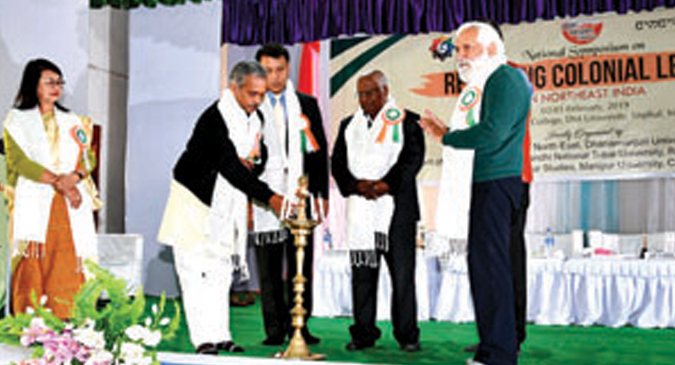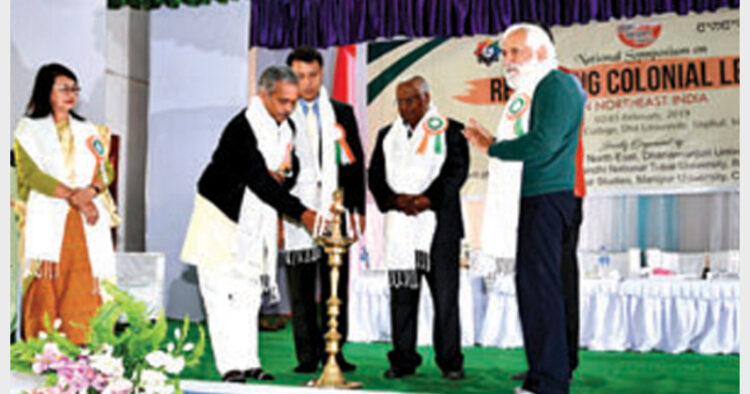National Seminar in Imphal on ‘Revisiting Colonial Legacy in North East India’
Rorrkychand Wahengbam
Imphal: Intellectual Forum of North East, Dhanamanjuri University of Imphal, Department of Social work at Indira Gandhi National Tribal University and Centre for Manipur Studies of Manipur University, Canchipur, jointly organised a national seminar on ‘Revisiting Colonial Legacy in North East India, from February 2 to 3 at GP Women’s College of DM University.

Shri J Nandakumar, Justice (retd) Shri KG Balakrishnan & Prof Kuldip Chand Agnihotri inaugurating the Seminar in Imphal
Addressing the gathering, national convener of Prajna Pravah Shri J Nandakumar said the seeds of British colonialism in Northeast India were sown with the Treaty of Yandaboo signed between the King of Ava and the British Government on February 24, 1826 which started British rule in Assam. In 1830, Cachar came under British jurisdiction. Subsequently, in 1854 the hill areas of Cachar were annexed followed by Lakhimpur in 1835 and Sylhet in 1858. Manipur had retained its status as an independent region (princely state), as well as the Khasi Hills, but Jaintia Hills came under the British rule in 1835. The Naga Hills was finally annexed as a District in 1866, followed by the Garo Hills in 1869.
He said the “Chin-Lushai Expedition” of 1889-1890 by British Government finally led to the permanent colonial occupation of Lushai Hills. Manipur also eventually came under British rule following the defeat in Anglo Manipuri War of 1891. In the early 18th century, the British Empire sought to establish trade routes with Tibet leading Sikkim to fall under British suzerainty. So, the whole of the region of present day Northeast India (NEI) formed originally by seven states of Assam, Meghalaya, Mizoram, Nagaland, Arunachal Pradesh, Tripura, Manipur, and Sikkim had been under British rule staring from varied times in the first quarter of the nineteenth century till Independence in 1947. He said because of the colonial impact we have not been able to concentre on our potentials to unite the country.
Former Chief Justice of Supreme Court Shri KG Balkrishnan stressed the need to revisit the colonial legacies in order to better understand the present political scenario. He also said colonialism was a historical phenomenon: conquest, emigration and subjugation happened in the history.
Vice Chancellor of Central University of Himachal Pradesh Prof Kuldip Chand Agnihotri said we all should try to understand ourselves with case study and stop saluting imposter historian and sociologists who infuse false ideas and ideals through their books and research. He said the Indian history would be complete only when the contributions of North East, North West and South Indian were included; otherwise it will remain as North Indian history only.
Minister of Education and Labour and Empowerment, Government of Manipur Shri T Radheshyam Singh said the colonial administrators exploited the local subjects and resources in order to fulfil their own interests. Ethnicity and various divisive measures were also introduced as administrative policy with far reaching consequences. They utilised the services of Christian missionaries to legitimise their rule over the conquered people. In the process, the colonisers outrightly rejected the native cultural practices including the belief system as ‘heathen’, ‘barbaric’, and ‘uncivilised’. This transformation compelled the native population to struggle to acclimatise to the new order that benefited the colonial masters, he added. Rajya Sabha MP Shri Rakesh Sinha said Indians should learn true nationalism, cultural unity and women empowerment from the north east.














Comments